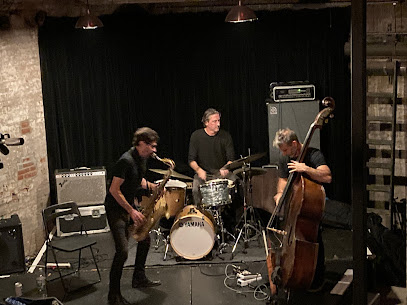Though at times similar in its free-improv language, the Main Drag show of October 11, 2023 had quite a different overall vibe from the one I previously reviewed two weeks earlier. Both were eclectic collections of disparate soundscapes, but while the sets on September 27th coalesced into a larger-scale form, this latter installment had fewer unifying threads. This was a night of the immediate, with many outstanding moments brought about by a cast of instantly recognizable improvisers.
A rising-star trio, featuring TJ Milan-Bombara on tenor sax, Gian Perez on guitar, and Asher Herzog on drums, began the night with a relatively short, unbroken set of concentrated intensity. This ensemble was not always the most balanced in terms of volume, with Perez sometimes dominating the aural space; however, the collective high energy somehow managed to make this work. All three players were really going for it, even in the occasional quieter sections. Both Perez and Milan-Bombara were constantly turning the dial between tonality and noise, showing a passionate vigor at both ends of the spectrum propelled by Herzog’s often restless drumming. Milan-Bombara displayed an impressive, well-timed “bag of tricks” - from tongue-slaps and key-clicks through circular breathing to literally screaming into his bell, and even shaking his salakot hat as a percussion instrument. I’m sure we’ll hear more from him in this series soon.
The second group illustrated just how different two improvising ensembles with a similar instrumentation can be. This set by alto saxophonist Travis Sullivan, keyboardist Eishin Nose, and drummer Bob Meyer was in several ways the opposite of the first set. This was a seasoned trio with an emphasis on listening, creating an interconnected group sound often made introspective and subdued through Meyer’s use of brushes. There were some tight grooves, but more interesting to me were sections in which the players occupied a single rhythmic space together without playing in time, such as over a slow rubato vamp Nose hit near the beginning. Though Sullivan and Nose entered the shred zone at powerful climactic points, both were always focused on lines or harmonies; there were almost no extended techniques. This was truly “free jazz” rather than “free improv”. One important distinction from the previous set was how this trio handled shifts of dynamic and density: everything here was gradual, with no one bumrushing the others in abrupt entrances.
Like September 27, this date happened to be another on which both Kevin Shea and Colin Hinton were busy, so Stephen Gauci’s weekly trio appeared again with a guest drummer. Patrick Golden joined Gauci and the trio’s regular bassist Adam Lane for a set with again a different collective sound from either usual lineup. Golden provided a busy stream of energy, keeping more of a consistent rhythm section role than Hinton or Shea often do. This support in the drums allowed Lane to take a more dominant role, really digging in with his bow and wah pedal. Gauci began with relatively subdued, linear vocabulary but didn’t take long to reach his characteristic high-overtoned register. The real magic here was in solo and duo moments. There were two sections of solo Gauci improv, both with a ritualistic edge that punched right in the gut. Lane was at his most uninhibited in duo settings, both with Gauci and Golden.
Until this show I was unfamiliar with vocalist Hanna Schörken, but seeing the rest of the lineup on the fourth set - Sandy Ewen on prepared guitar, Eric Plaks on keyboard, and James Paul Nadien on drums - I knew we were in for something spectacular. This was by far the most genuinely Dada set I’ve heard yet in this series. Free-improvised vocals can be hard to get to, but Schörken’s style was utterly mesmerizing, full of consonants, breathy syllables, and extreme high and low registers. Her versatile playfulness fit right in with Ewen and Nadien at their noisiest. Nadien was inspired to a performance-art level of absurdity with literal bells and whistles, humming into his snare drum, and hamboning his face and chest. As the one instrumentalist using linear and chordal material, Plaks could have seemed out of place, but his melodies and harmonies really formed one more layer for Schörken to react to. He blended a bit more with the others around the middle of the set through the use of distortion as well as his trademark flying-fingered shredding. The dialogue between Schörken and Plaks toward the end was particularly fascinating, like a Dadaist art song until Ewen and Nadien entered to spur them on to some exuberant closing pyrotechnics.
The show finished with the newest of this series’ regular large ensembles, Adam Caine's Main Drag Guitar Orchestra, in its second of hopefully many performances. This and the preceding quartet were the dual high points of the night for me. The music of the guitar orchestra was nothing like I had expected, especially given the personnel: a redoubtable slice of New York’s avant-jazz guitar scene comprising Gian Perez, Sam Day Harmet, Keenan Ruffin, Nick Saia, Matt Hollenberg, Max Kutner, Harvey Valdes, and Aaron Quinn with Colson Jimenez on electric bass and Vijay Anderson on drums. Caine trained this beast of an ensemble through six elegant original compositions. Most were impossible to assign to genre but several had a pretty, almost classical sound. Though there were plenty of opportunities for things to get quirky and angular, the polished sonic environment was a far cry from the resolute abstraction within every constituent player’s capability. One piece was even a straight-ahead jazz blues, on which trading between all eight guitarists led to many goofy moments of skronkularity. The last piece was a satisfyingly strong ending: a riveting chunk of rock minimalism, full of imposing unison loops that steadily built up momentum to a massive final chord.
Watch the whole show on Youtube!









